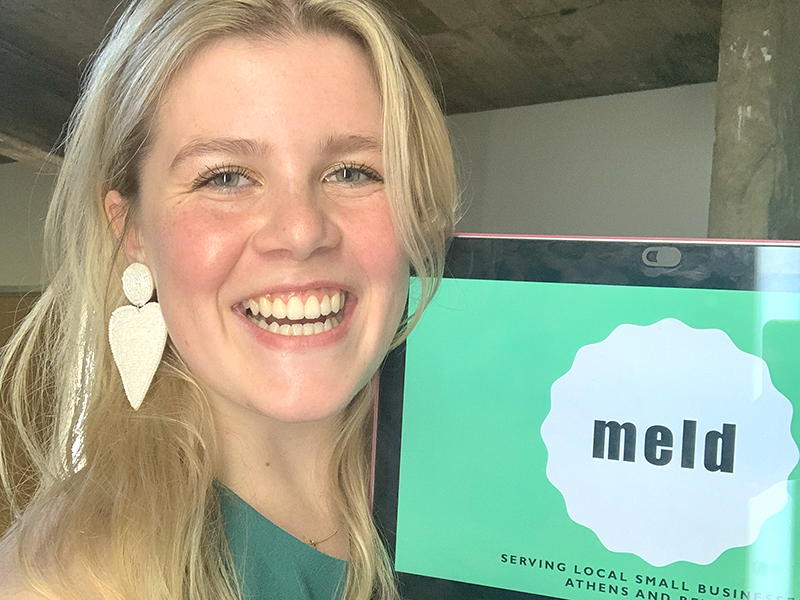A startup idea called Meld, an internship platform connecting college students with small businesses seeking workers, won the $2,500 top prize at the University of Georgia’s 2021 Community Design Sprint virtual pitch competition.
Created by Sabrina Greco, a Franklin College of Arts and Sciences senior majoring in French and psychology, Meld would respond to the needs of small businesses in college towns. Students complete a profile, personality assessment and match with compatible businesses in terms of skills, goals and interests.
“We’re not trying to be LinkedIn, Indeed or Handshake,” Greco said. “Meld’s algorithms offer small businesses the insights, suggestions, analytics, and personality and culture matching they don’t have with other job boards. There isn’t a platform that exists just for small businesses, and the available platforms are not targeted to the talent pool. Meld targets small businesses and allows them a direct line into the university’s top talent.”
The Community Design Sprint is hosted by UGA’s Entrepreneurship Program and the Innovation District initiative. The sprint began on May 17, pairing students with design thinking faculty across the UGA campus to re-imagine Athens’ businesses as they emerge from the pandemic. Don Chambers, the associate director of the Entrepreneurship Program, was the lead designer and facilitator of the sprint. He was aided by faculty from across campus including Dee Warmath, an assistant professor in the College of Family and Consumer Sciences, and Andrew Potter, the UGA director of Experiential Learning.
After interviewing students and local business owners, Greco pivoted Meld’s approach to the problem she was at first trying to solve.
“When I started, I was looking at it from the standpoint that college students were the ones with the issues, that there weren’t enough opportunities for them to test their classroom skills,” she said. “But after plenty of interviews, I realized students were not the ones with the problem — small businesses needed help tapping into the student talent.”
Greco’s ardor for her business was recognized by the judges.
“The enthusiasm on your presentation was fantastic. It’s so easy to get attention when you’re excited about the story that you’re telling,” said judge Jim Chasteen, owner and co-founder of ASW Distillery in Atlanta. “I have an affinity for college towns because I was raised in Athens, and I think Meld is incredibly timely. This concept is farther along — you could get it up and running in Athens within a few weeks if you have the right folks on your team — and take it to Nashville or Murfreesboro or Greenville. Small towns lose people to New York and Atlanta like crazy, and talent retention is a big deal for these smaller towns. This would make some strides to help that.”
Chasteen was joined by judges Chris Goeckel, a serial entrepreneur who worked with Oracle and is now the CEO of eBS Inc.; Abigail Snyder, winner of last year’s design sprint who plans to join KIND Snacks as a trade marketing coordinator in the fall; Kristina Jaskyte Bahr, an associate professor in UGA’s School of Social Work; and David Sutherland, a senior lecturer in the Entrepreneurship Program.
The other teams reaching the Community Design Sprint finals were:
- Blue Catalyst, a club dedicated to social entrepreneurship, created by College of Engineering senior Hannah Chaffee and Jessica Tardy, a Terry student majoring in economics and psychology.
- Pool Protection Technologies, a startup developing an ultrasonic sound wave device that can kill algae in residential swimming pools, created by College of Engineering students Samuel Brewster and Garrett Stigall.
- Make Your House a Home, a concept that would use videos to help people let go of the stresses of hosting parties in their homes, created by Georgia MBA student Mary Rebecca Harakas and Meagan Bilus, a finance manager at HBO.
“All the teams were fantastic,” said Chasteen, whose company was the corporate sponsor for the 2021 Community Design Sprint. “As an alumnus, I’m just so excited about some of the problems we’re looking to solve as a university.”

